I remember the day I got my first smartphone. Upgrading from a “dumb phone,” I was dazzled. Crisp and clear pictures. Email and calendar in one place. Ready access to Twitter, Facebook, and any search engine I wanted. In the words of the AT&T ad, I could now “move at the speed of instantly.”
But as the months went on, I realized my smartphone was not a neutral tool that would leave my life unaffected. My days started to change—sometimes drastically. It began with email. I started checking it almost obsessively. Wake up, turn over, check email. Get coffee, check email. My daughter would ask a question. “Hold on, honey, I’m just finishing this email.”
Then came social media. I could now post pictures directly to Facebook. Yet rarely did I consider whether my 300 “friends” needed to see my weekend family adventures. Twitter became my news source. Even though I clicked on dozens of articles, I noticed I never read them through. My thoughts started to fragment into smaller and smaller pieces. Oddly enough, even though I now held in my hand the key to unparalleled productivity, at the end of the work day I felt a new level of exhaustion.
Tony Reinke’s new book, 12 Ways Your Phone Is Changing You, makes explicit what many of us feel bubbling under the surface: quietly, subtly, our phones are changing us.
Reinke catalogues the quiet catastrophe he believes our phones are causing. For instance:
We’re distracted. We check our smartphone 85,000 times a year, or once every 4.3 minutes.
We’re a hazard to others. Texting and driving makes us 23 times more likely to get in a car accident.
We crave approval. Each social media moment is another scene in our “incessant autobiography.”
We idolize celebrity. Our attention drifts from the eternal toward the latest headlines and gossip.
We become lonely. “Technology is drawing us apart, by design. We feel the sting of loneliness in the middle of online connectedness,” Reinke says.
We get lost in the digital noise. The average daily social media and email output is larger than the Library of Congress.
We lose track of time. The wonder of people, plants, nature, and art—even God himself—gets lost in the whirl of “urgent” notifications.
All in all, Reinke makes an admirable attempt at bringing theology to bear on our digital devices. Snarky remarks on Facebook proliferate, but Scripture calls us to steer clear of slander and honor others with our words (James 4:11–12; Eph. 4:29). We seek approval from social media, but true approval comes from God (Rom. 2:29). We struggle with “fear of missing out,” or “FOMO,” yet the scope of eternity dramatically reframes our perspective (Luke 16:19–31).
After reading the book, I felt like I had a digital cancer growing in my pocket. Each chapter builds on what smartphones are allegedly doing to us: creating isolation, distraction, addiction, idolatry, and a host of other ills. Less-than-inspiring subtitles abound: “FOMO in the Grave,” “Junk Food for the Soul,” “Technology and Isolation.”
Perspectives on technology generally gravitate toward one of two poles. Instrumentalism says technology is just a neutral tool, an “instrument.” The popular phrase “Guns don’t kill people. People kill people” expresses this view. Technological determinism, however, says that technology is an unstoppable force shaping society—and each of us. The machines are out of control and must be resisted, lest we end up like the human drones of The Matrix.
We miss the point if we become either pro- or anti-technology. Instead, liberation from our smartphones (and all our technology) is best summed up by the psalmist: “I will walk about in freedom, for I have sought out your precepts” (119:45). In contrast to the American view of freedom—essentially, lack of restraint on individual choice—the Bible sees true freedom as a matter of living within proper boundaries.
The redeeming gem of Reinke’s book is found in asking readers to define those boundaries. After reading a list of 12 questions under the heading “Should I Ditch My Smartphone?,” I asked myself, What do I really need my phone for?
As I began deleting apps and setting new boundaries, I found myself catching an appealing vision of a better—and slower—life. And my phone once again became just a tool, to be used like all good things given by God (James 1:17).
Jeff Haanen is executive director of Denver Institute for Faith & Work and founder of the 5280 Fellowship.











